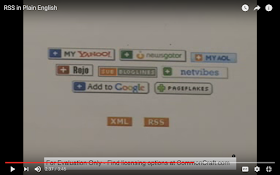Valued Readers!
We are grateful for your support and patronage so far.
In order to keep you updated about recent posts, we have added the RSS Feed Subscription Button!
We are grateful for your support and patronage so far.
In order to keep you updated about recent posts, we have added the RSS Feed Subscription Button!
What are the benefits of subscribing to RSS Feeds?
- You do not have to bookmark your favourite sites and go check if there are any new updates or posts - the RSS feeds will bring the updates to you!
- You save time!
- You do not miss-out on important and interesting information.
What are the popular feed (news) readers?
- My Yahoo!
- www.bloglines.com
- www.newsagator.com
There are many more as shown in the picture below:
How to subscribe to and read RSS Feeds?
- You may already be having a yahoo account if so just login. If not you need to create an account with anyone of them
- Then you click on orange coloured radar button on the top right corner of our page under the head. "Subscribe Now"
- Watch this video, "RSS in Plain English"
Subscribe Now! Save time and enjoy learning wealth creation at our "Value Investing @ Wealth Vidya".
Thank you,
Anand


